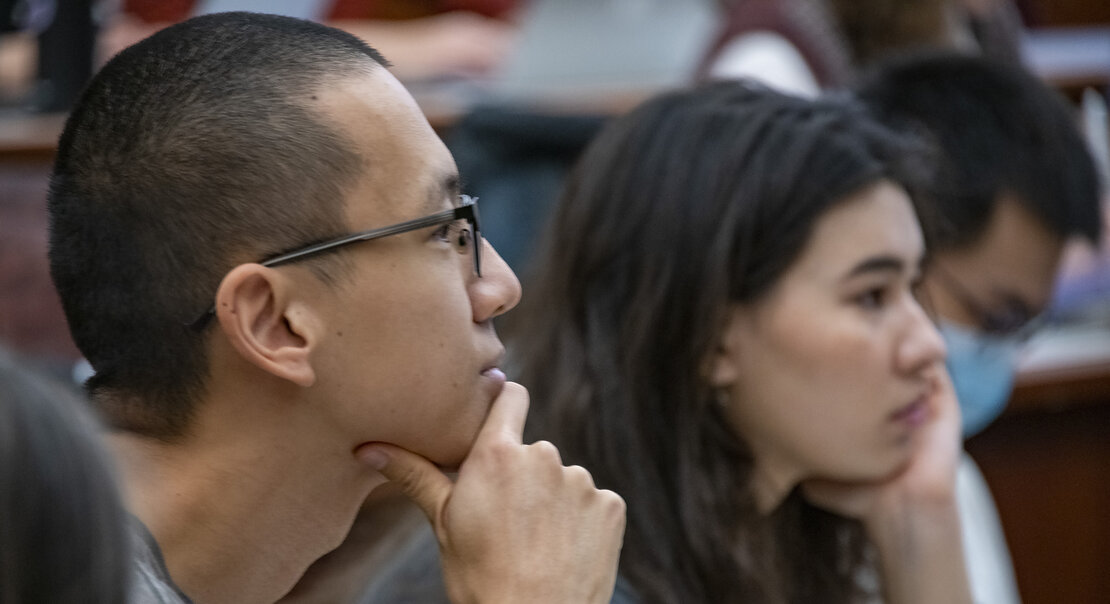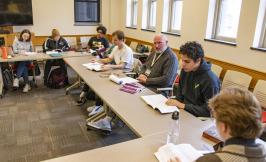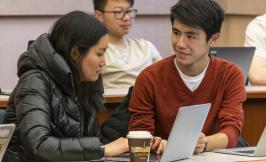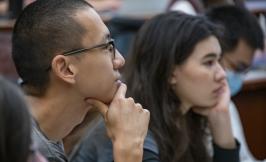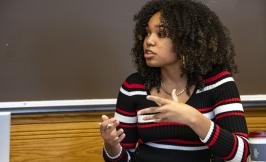Department of History BA Program
Describing the program and student outcomes, Peggy Heffington, the department’s Assistant Director of Undergraduate Studies, explains that History at UChicago is a thriving major that attracts dozens of students each year and continues to grow despite national trends to the contrary. Our students have received international honors and established themselves in notable careers in finance, education, consulting, law, government, the arts, journalism, and nonprofits after graduation. Fully a third pursue graduate or post-baccalaureate programs in law, public policy, history, and even the sciences (recent grads are in physics and chemistry programs).
"While many social science and humanities majors nationally are shrinking, we are proud to say that UChicago's History Undergraduate Program is vibrant and growing. There are nearly 80 majors in the class of 2025 along with 23 minors, both up from last year. Though writing a Thesis is not required, forty majors—more than half!—from the Class of 2025 have elected to write one. History's Thesis is a rigorous, demanding process that asks students to complete a large-scale piece of original historical scholarship over the course of a calendar year, from the spring of Third Year to the spring of Fourth Year. The final Theses they produce are equivalent in length and quality to many MA theses and are a testament both to the training the Department of History provides and to the enthusiasm, intellectual curiosity, and hard work of its majors. Outside of the classroom, History students regularly serve as Research Assistants with faculty members through History's Undergraduate Research Assistantship Program and pursue faculty-led and independent research. In recent years, History students have been named finalists and winners of national fellowship competitions including Boren, Fulbright, Rhodes, and Gates Cambridge. Additionally, students sustain an active social and intellectual life within the department. For example, the Chicago Journal of History, a student-run undergraduate research journal, solicits submissions, edits, and publishes print and online editions twice yearly."
To illustrate the impact of the program, we interviewed three current History majors—Jacob Halabe, Christopher Lamm, and Elena Tiedens—who share their experiences at UChicago.
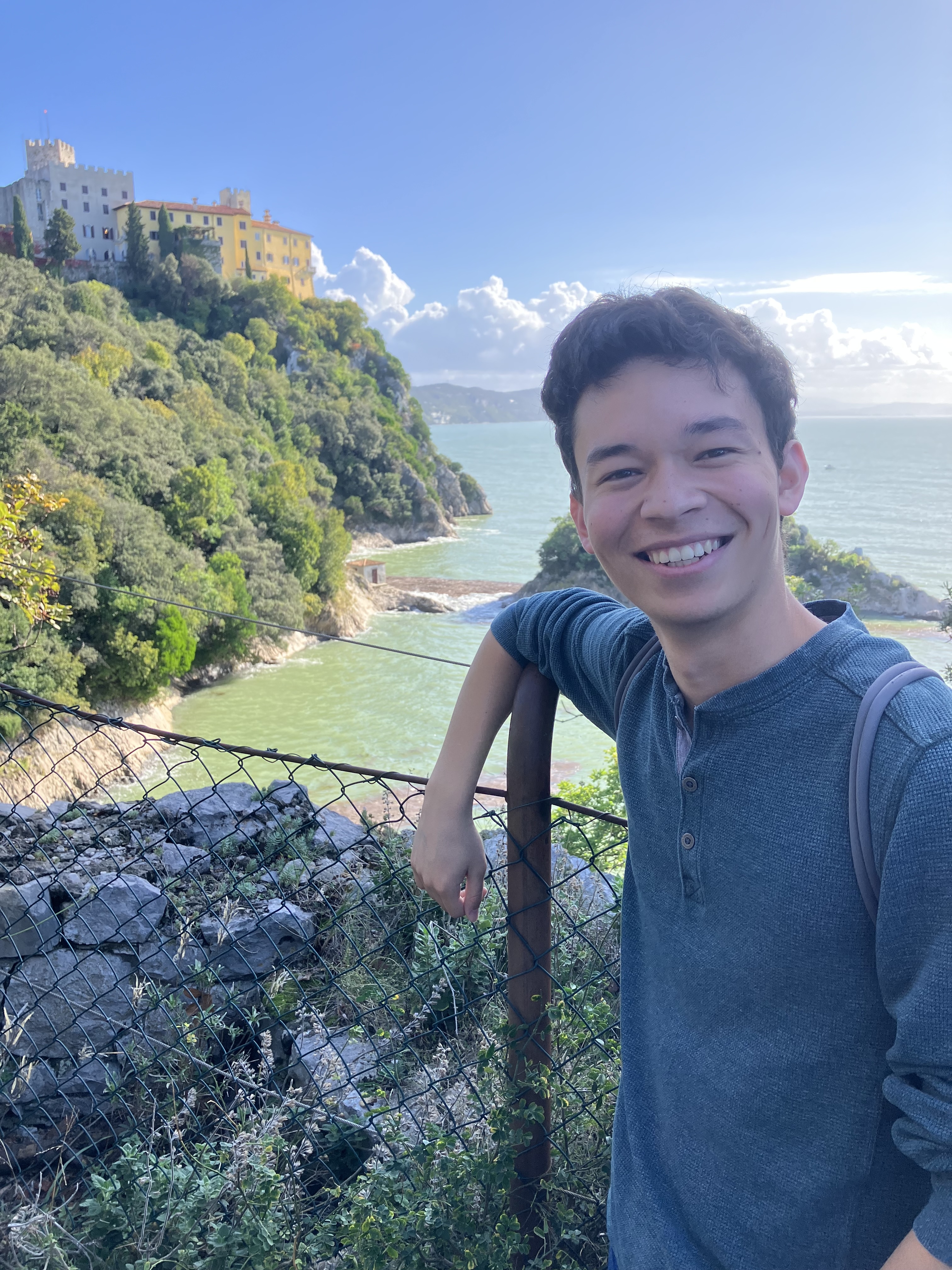
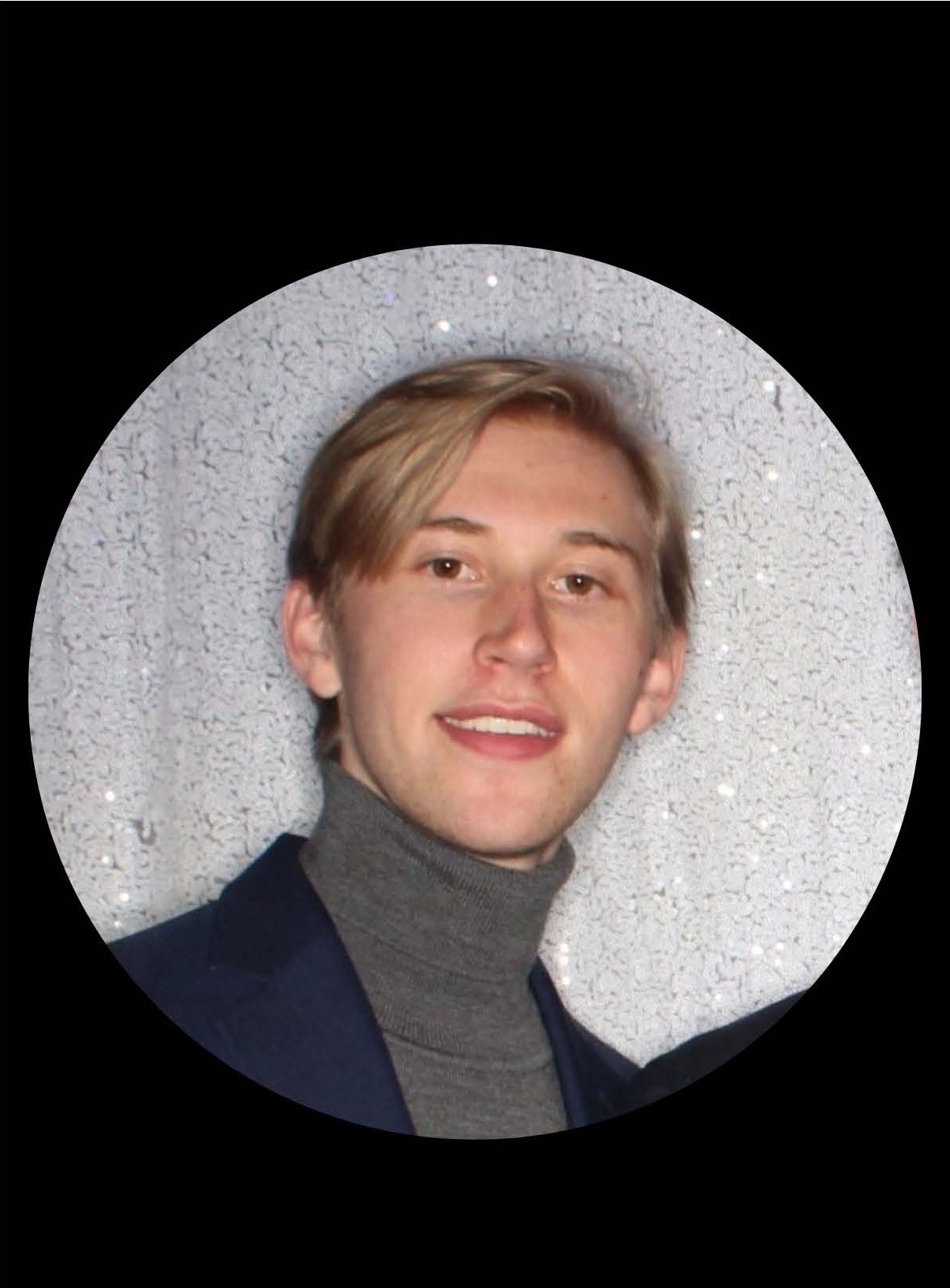
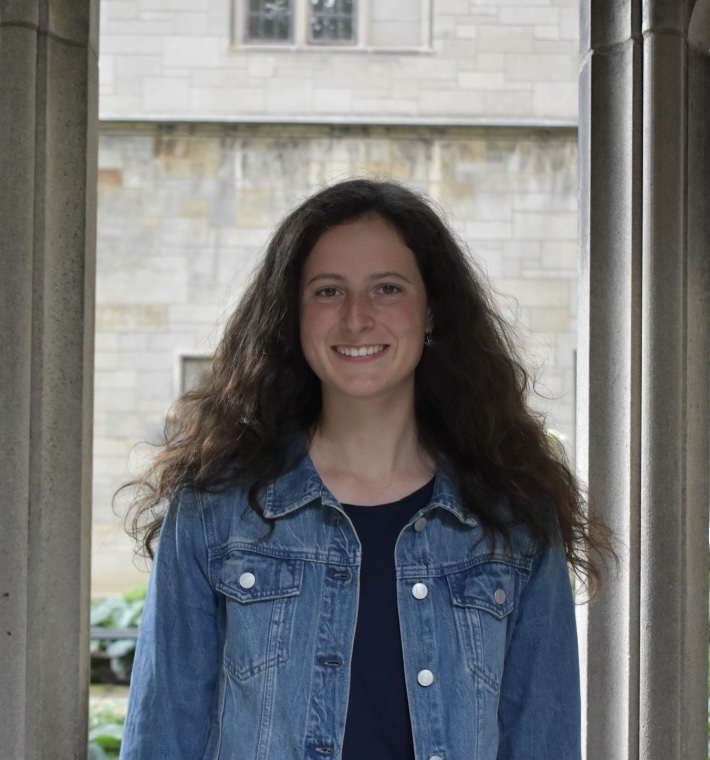
Jacob Halabe Christopher Lamm Elena Tiedens
Tell me a little bit about your undergraduate experience at UChicago. What is your academic program and are you involved in other activities on campus?
Jacob Halabe: Along with being a history major, focusing on European history, I’m also pursuing a degree in business economics. Outside of the classroom, I’m part of Occam’s Razor, UChicago’s independent improv troupe, and am also the Co-Editor-in-Chief of the Chicago Shady Dealer, the campus satirical newspaper. One thing I’ve really appreciated about being a history major at UChicago is the way it has allowed me to develop my writing abilities and has given me a rich body of references to draw on in my other activities at the school.
Christopher Lamm: I came to UChicago already interested in history. I was placed in Snell House which appealed to my sense of history. Snell Hitchcock is the oldest dorm in use today and was originally built in the 1890s.
On campus, I have participated in several intramural sports including soccer, floor hockey and foosball. I also have a bike, which I occasionally use to get to class and greatly enjoy riding to the lake. My academic program is history, in which I am pursuing the BA track and writing a History Thesis.
Elena Tiedens: I am a History major with a concentration in Environmental History and a minor in Russian and Eastern European Studies. Although I knew I wanted to be a History major even before I arrived at UChicago, I have thrived learning about the intricacies of environmental and energy history and taking many other history electives throughout my time in UChicago’s History Department. I have also enjoyed learning Russian to complement my historical research.
Outside of my academics, I was the President of the Phoenix Sustainability Initiative, UChicago’s largest student-run sustainability organization of 80+ students, and I am the Chair of the Green Fund, a $50,000 grant that provides funds to student-led sustainability projects.
What about historical study is particularly important to you? Why did you choose to major in History and what would you tell others who are considering?
Jacob: I’ve been interested in studying history ever since high school. For me, history is the world’s repository of all the weird and fascinating stories of humankind. I once heard Ada Palmer, a history professor at the college, say that history is often stranger than fiction because history has no obligation to be plausible to a reader.
I’d encourage anyone interested in majoring in history to try any class in the department that seems interesting, even if it doesn’t line up with your focus in the major. Some of my favorite history classes I’ve taken UChicago were picked basically on a whim, because the course seemed interesting.
Christopher: I was motivated to study history at the University of Chicago because of how important I believe history is for everyone, not just academics. I believe that we can learn from the past in order to better understand the present, and that we can use what we learn to have a positive impact on our society today. My experiences with the history department, from tenured to associate professors, have been incredibly positive. Not only do I feel that the department is well-organized and consists of outstanding faculty, but they also seem to truly care about both the study of history and the passions of students within their program. This is evident in the support I have received while working on my BA Thesis. Despite the fact that I have chosen an extremely niche topic – Medieval Iceland – the department has been encouraging and supportive of my study.
For anyone considering a major or minor in history I strongly recommend taking a history course to gauge your interest. There are ample history courses well-suited to “non-humanities” majors, and these provide a wonderful gateway into the field for anyone who may be undecided.
Elena: I have always loved history, and I can’t imagine having majored in anything else. I believe that a thorough understanding of our collective past is essential to grappling with the future. This learning applies to many topics, from everyday life to gender, empire, and the environment. I hope that those considering majoring in history know that history offers a nuanced understanding of nearly any topic from a methodologically sound backing in archival research. The history classes I have taken are also among the best classes I have taken at UChicago.
Finally, I would encourage other students to major in History because of the BA Thesis program. The History Department does a wonderful job scaffolding the thesis and providing support at every stage of the writing process.
Please describe your History research project. What led you to it in the first place and how is the project progressing? Have you come across anything that stands out as particularly interesting, consequential, or otherwise noteworthy?
Jacob: I’m currently writing my thesis on the Thieves’ Cant, a specialized form of slang allegedly spoken by thieves and ne’r-do-wells in the criminal underworld of London in the seventeenth and eighteenth centuries. I specifically look at the way everyday people adopted the Thieves’ Cant to navigate and criticize the rise of capitalism in a rapidly changing London. A series of high-profile cases of financial fraud in the 1700s (including the famous South Sea Bubble) created a widespread impression that there was something criminal lurking within large portions of the English economy. As a language of criminals, the Thieves’ Cant emerged as a natural way for ordinary people to express their cynicism and distrust amidst the growth of financial capitalism.
I had originally begun my project planning to focus only on London’s criminal underworld and their use of the cant. However, as my research progressed, I realized that the story of the Thieves' Cant was far more complex than I first thought, implicating everyone in London from stockbrokers to the highest echelons of government. A fun fact: before the word bubble referred to an inflated financial market, it was a slang term for a trick or a scam. It’s something good to remember, in our own era of financial panics and runaway stocks.
Christopher: During the Autumn of my third year, I took a course called “Violence in Medieval Europe,” which included study of Medieval Iceland. I’ve always been interested in Scandinavian history given my Norwegian heritage, but this was the first time I had engaged rigorously with the subject in an academic setting. While writing my final paper for the course, about the types of violence and feuding in Medieval Norway and Saga Iceland, I realized how passionate I was about the material, and decided to write my BA Thesis on a similar topic. I was initially drawn to Iceland due to the isolated nature of both the political and geographical landscapes, which makes it a great case study for the development of early government. Through my continued study, and summer research in Iceland, I honed my focus: to pursue research relating to the Settlement and Commonwealth Eras in Medieval Iceland.
My research will focus on the impact of cultural beliefs and norms on early forms of government. I will explore how Medieval Iceland’s informal government-maintained stability despite a lack of central authority, and how cultural norms of violence, honor, revenge, magic, and dispute resolution actually benefitted their society rather than inducing anarchy or chaos. Historians have demonstrated that Medieval Icelandic society functioned relatively well during the Commonwealth era (930–1264AD); my thesis will explore specifically how these afore- mentioned societal norms maintained order. As mentioned, my study will center on the Commonwealth period, which spans the establishment of the Althing (930AD) to Iceland’s acceptance of the “Old Covenant” with Norway (1262-64AD).
Elena: My thesis is about the history of nuclear-powered icebreaker boats in the Russian Arctic. I ask how at the collapse of the Soviet Union, various international and Russian actors used Soviet nuclear icebreakers to accomplish new goals - including the extraction of oil and gas in the far North. I hope to show that during regime change, inertia does not necessarily propel the sustained use of infrastructure but rather the functions of old infrastructures and technological systems are continually made and remade in new political and economic contexts.
I first became drawn to my thesis topic in Professor Aaron Jakes’ colloquium class on the Suez Canal. Although Arctic boats and the Suez Canal seem to have little in common, in this class, I enjoyed thinking about the historical origins of global shipping routes, like the Suez Canal and the Northern Sea Route. After writing a much earlier paper on nuclear icebreakers in my colloquium class, I received the Straetz International Research Grant to go to Oslo and Northern Norway to conduct archival and oral historical research for my thesis.
What are your post-baccalaureate plans?
Jacob: I’m currently applying to jobs to work in Chicago after I graduate. Whatever I do, I know I’ll bring all of the skills and knowledge I learned as a history major at UChicago with me.
Christopher: During my first two summers at UChicago I had internships in finance. I enjoyed my time working in the field, and while I may end up in finance, I am currently pursuing further research related to my BA Thesis.
In the immediate future, I am planning on pursuing graduate study at the University of Oxford or at the University of Iceland. These are two of the only institutions in the world that have historical programs focused on Medieval Iceland, and that also offer courses in Old Norse. This is a unique combination that I am excited to engage with after my time at the University of Chicago.
Elena: I do not have any post-baccalaureate plans currently. I would like to spend some time abroad to gain a more global perspective.
 THE UNIVERSITY OF CHICAGO
THE UNIVERSITY OF CHICAGO





